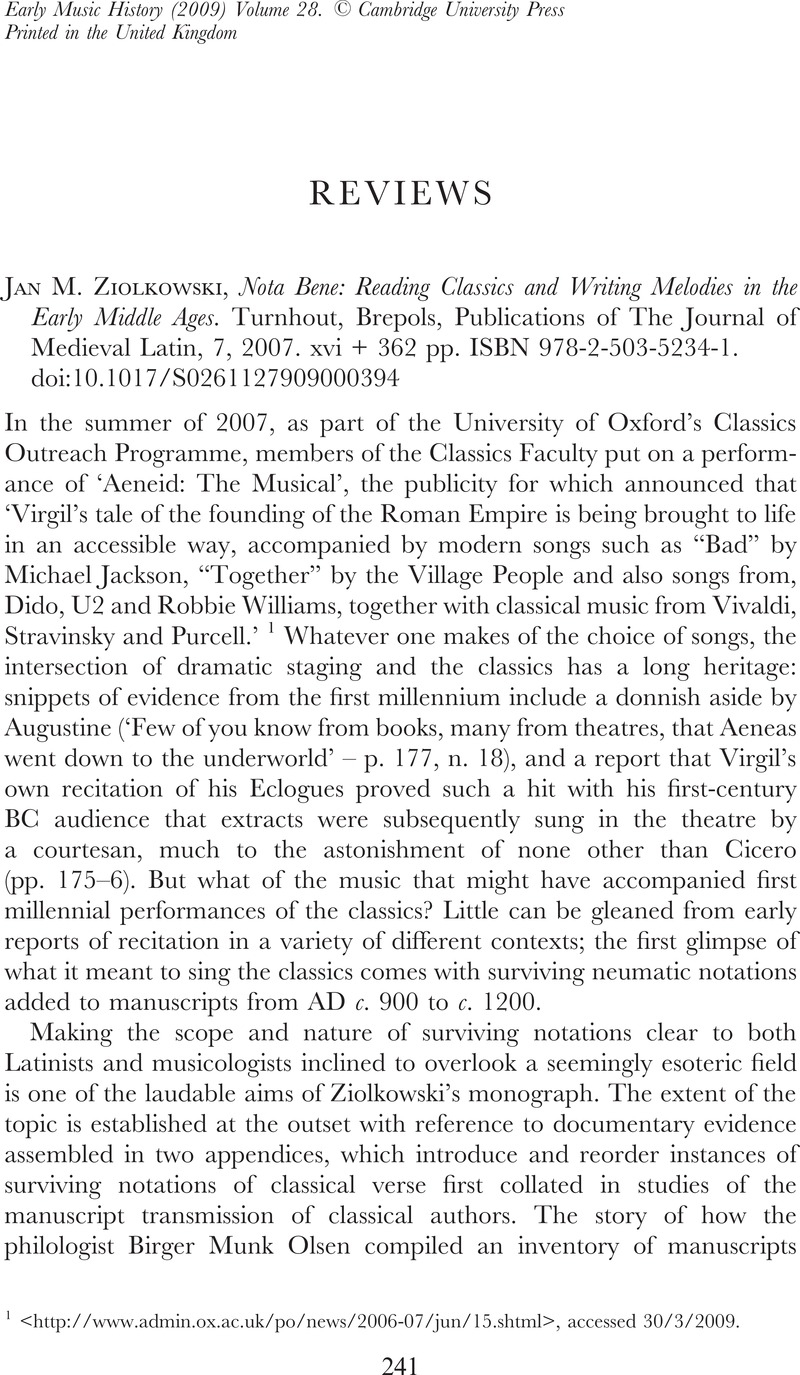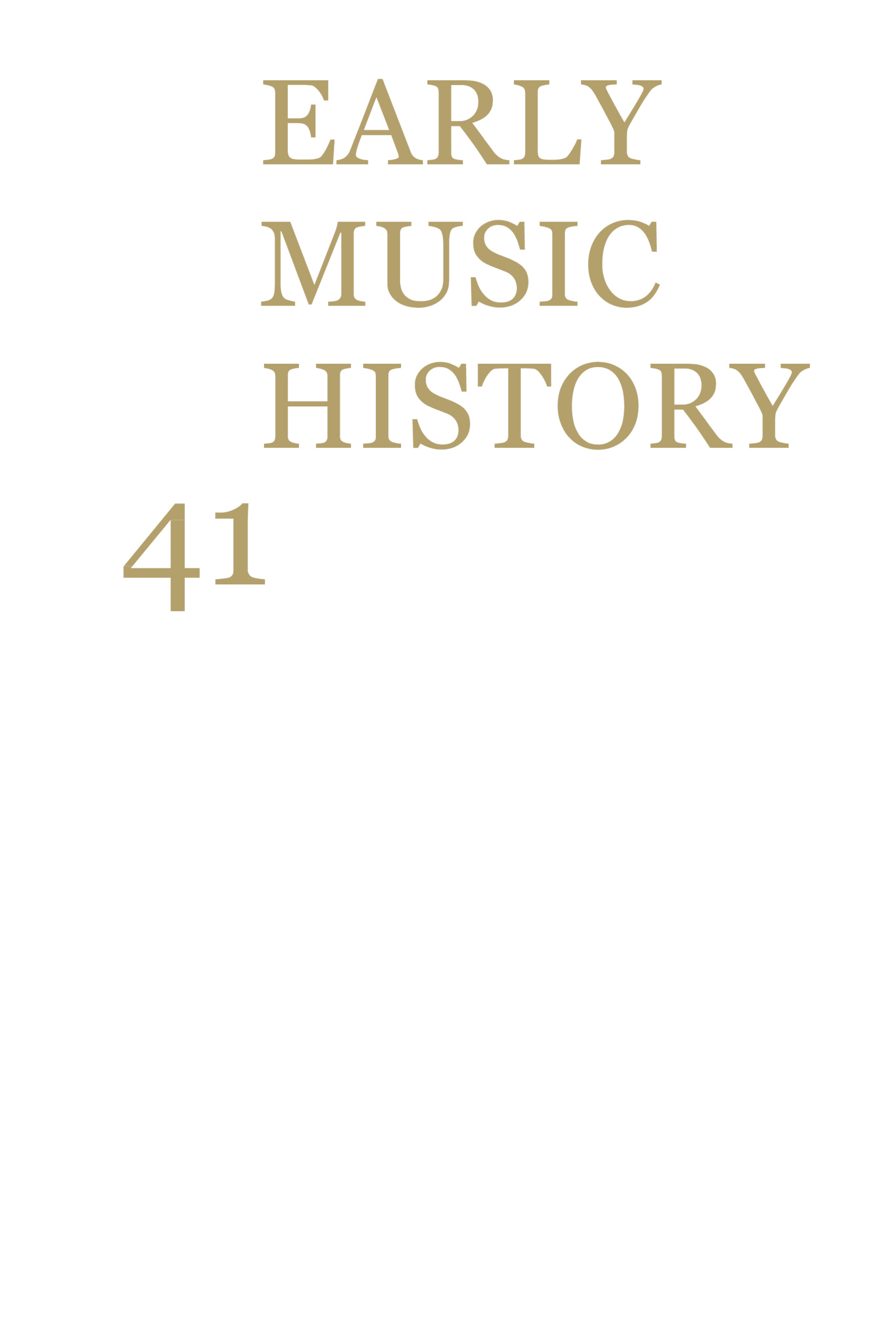No CrossRef data available.
Article contents
Jan M. Ziolkowski, Nota Bene: Reading Classics and Writing Melodies in the Early Middle Ages. Turnhout, Brepols, Publications of The Journal of Medieval Latin, 7, 2007. xvi + 362 pp. ISBN 978-2-503-5234-1.
Published online by Cambridge University Press: 24 August 2009
Abstract

- Type
- Reviews
- Information
- Copyright
- Copyright © Cambridge University Press 2009
References
1 <http://www.admin.ox.ac.uk/po/news/2006-07/jun/15.shtml>, accessed 30/3/2009.
2 S. Wälli, Melodien aus mittelalterlichen Horaz-Handschriften: Edition und Interpretation der Quellen (Monumenta monodica medii aevi: Subsidia Band III; Kassel, 2002). Gundela Bobeth's study will be published in the same series.
3 J. M. Ziolkowski and M. C. J. Putnam, The Virgilian Tradition: The First Fifteen Hundred Years (New Haven and London, 2008).
4 L. Treitler, ‘Reading and Singing: On the Genesis of Occidental Music Writing’, Early Music History, 4 (1984), pp. 135–208.
5 J. M. Ziolkowski, The Cambridge Songs (Carmina Cantabrigiensia) (Medieval & Renaissance Texts & Studies, 192; Tempe, Ariz., 1998).
6 CH-Beb 455, fol. 24r–v. The implications of the shortened form are not clear; it is possible that the eclogue originally continued since the end of the text coincides with the end of a gathering. Continuation of sense and syntax across the strophes, as well as a change of speaker within them, is not uncommon in adaptations of stichic verse to strophic song; several examples occur later in the same manuscript for metra extracted from Boethius' De consolatione philosophiae.
7 C. P. E. Springer, The Manuscripts of Sedulius: A Provisional Handlist (Philadelphia, 1995). The neumes listed for Cantemus socii Domino in Paris, Bibliothèque nationale de France (F-Pn) lat. 18554 were in fact added to A solis ortus cardine (fols. 54v–55r). Neumatic notation is also mentioned for the latter poem in three manuscripts copied during the ninth to eleventh centuries: The Cambridge Songs – GB-Cu Gg. V. 35, F-Pn lat. 13377 and a privately owned manuscript held in Paris. In addition, versions of the same poem adapted for use in the liturgy during the Christmas season (strophes A–G) and Epiphany (Hostis Herodes, strophes H–N) are found without notation in the hymnic section of CH-Beb 455, while the full text is included in another ninth-century verse collection (Brussels, Bibliothèque Royale de Belgique/Koninklijke Bibliotheek 8860–8867, fols. 23v–25r), almost all of whose poems are found elsewhere with notation and several of which are copied out in refrain forms. A shortened version of Cantemus socii Domino (ll. 1–26) is transmitted without notation in Verona, Biblioteca Capitolare 88, the common feature among whose often truncated additional poems by late antique authors (Prudentius, Sedulius, Boethius and Venantius Fortunatus) is that they survive with notation in other sources.
8 D. Schaller and E. Könsgen (eds.), Initia carminum Latinorum saeculo undecimo antiquiorum: Bibliographisches Repertorium für die lateinische Dichtung der Antike und des früheren Mittelalters (Göttingen, 1977); with a supplementary volume completed by Thomas Klein published under the same title in 2005. Brepols Online Database: In principio: Incipit Index of Latin Texts, <http://www.brepolis.net/>, updated biannually.


